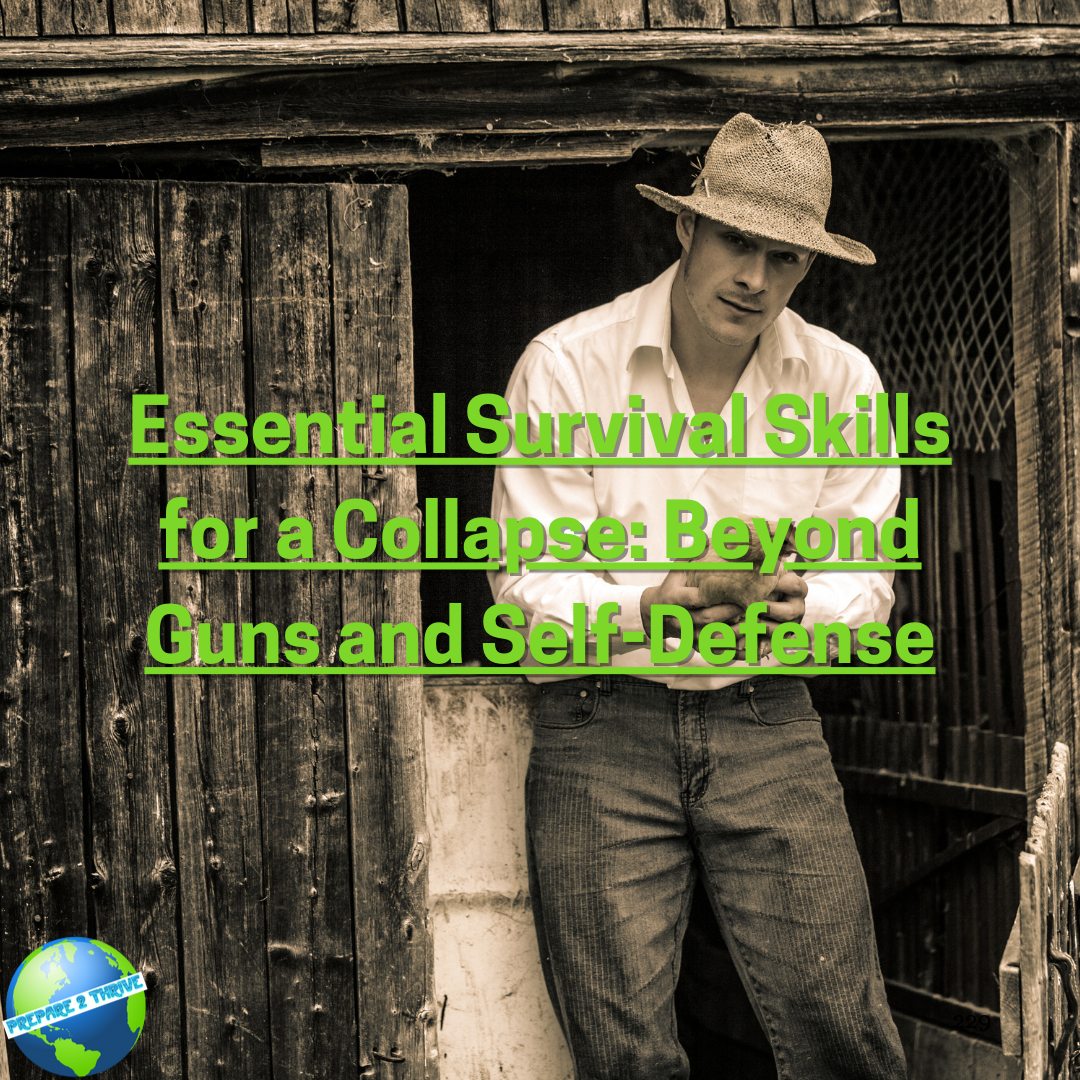When we imagine a world thrown into chaos by an economic collapse or social anarchy, it’s tempting to think that guns and self-defense would be the most important tools for survival. However, history, particularly the experience of the Great Depression, teaches us that while security is important, the skills needed to survive-and even thrive-are much broader. Practical, everyday survival skills, such as cooking, sewing, and agriculture, were essential in the 1930s, and would be just as valuable today in the event of a societal breakdown.
In this article, we’ll explore the most important skills you would need to sustain yourself and your community if modern conveniences disappeared.
1. Agriculture and Food Production
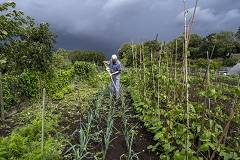 When supply chains falter and grocery stores run empty, the ability to produce your own food becomes critical. Modern urban living has distanced many from agriculture, but cultivating food is a foundational survival skill.
When supply chains falter and grocery stores run empty, the ability to produce your own food becomes critical. Modern urban living has distanced many from agriculture, but cultivating food is a foundational survival skill.
-
Gardening and Farming: A solid understanding of growing food is essential. From managing soil health and knowing the right crops for your climate to practicing crop rotation and managing pests, gardening provides a reliable food source. Learning to grow a variety of crops like vegetables, grains, and fruit can help sustain you in the long term.
-
Animal Husbandry: Raising livestock such as chickens, goats, or rabbits for meat, milk, eggs, and wool is another valuable skill. Knowing how to care for animals, provide feed, and maintain their health is vital for sustainable food production.
-
Foraging: In addition to growing food, foraging for wild edibles can supplement your diet. Learning to identify local edible plants, mushrooms, and nuts is a useful skill, especially in rural or wooded areas.
-
Hunting and Fishing: While gardening provides long-term food stability, hunting and fishing can provide additional protein when food supplies are low. Knowing how to track animals, safely use traps, and process meat is essential.
- YouTube Video: Man grows ALL of his food on 750m² Only 20% of your garden should be vegetables.
- YouTube Playlist: Raising livestock by lferrell197822 • 14 videos
- YouTube Playlist: Raising Livestock by Tractor Supply Company • 7 videos
- YouTube Playlist: Wild Food BC by Samantha Douglas • 37 videos
2. Food Preservation and Preparation
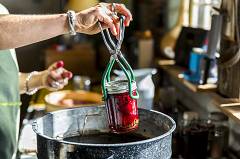 Once food is grown or gathered, preserving it for future use becomes critical, especially when there is no access to refrigeration or modern conveniences.
Once food is grown or gathered, preserving it for future use becomes critical, especially when there is no access to refrigeration or modern conveniences.
-
Canning and Pickling: Preserving food through canning, pickling, fermenting, or drying ensures you have a stockpile for the winter or times when fresh food is scarce. Understanding how to properly can vegetables, fruits, and meats will prevent spoilage and extend your food supply.
-
Butchering: If you raise or hunt animals, knowing how to butcher and process them is a vital skill. Proper butchering provides you with not only meat but also hides, bones, and fat for various uses.
-
Cooking from Scratch: In a world without fast food or ready-made meals, the ability to cook from basic ingredients will be invaluable. Mastering techniques like baking, open-fire cooking, and making bread or broth from scratch will help you make the most of your available food.
- YouTube Playlist: Food Preservation and Preparation by David Crawford • 6 videos
- YouTube Playlist: The Butcher | Official Series Playlist by HISTORY • 21 videos
- YouTube Playlist: Cooking & Butchering by MeatEater • 106 videos
- YouTube Playlist: Butchering Game meat by J Wilson • 57 videos
- YouTube Playlist: butchering and prepping game meat by darkRifle98 • 19 videos
- YouTube Playlist: All Wilderness Cooking recipes by WILDERNESS COOKING • 351 videos
- YouTube Playlist: Learn to Cook! Cooking Basics by Hilah Cooking • 48 videos
- YouTube Playlist: Cooking Tutorials by TheCraftyGemini • 20 videos
3. Shelter and Construction
 A safe, sturdy shelter is necessary for protection from the elements and potential threats. Whether you live in a house, cabin, or make-shift shelter, you need the skills to maintain and repair it.
A safe, sturdy shelter is necessary for protection from the elements and potential threats. Whether you live in a house, cabin, or make-shift shelter, you need the skills to maintain and repair it.
-
Basic Carpentry and Home Repair: Being able to repair your home or build new structures is crucial for long-term survival. This includes everything from simple repairs like fixing a roof or window to more complex projects like building a shed, chicken coop, or outhouse.
-
Masonry: If you have access to stone or brick, basic masonry skills will allow you to construct more durable structures such as fireplaces, ovens, or secure shelters.
-
Plumbing and Water Systems: Access to clean water is one of the most important aspects of survival. Learning to maintain or build basic plumbing systems, such as rainwater catchment, greywater recycling, and simple filtration systems, will keep you supplied with water for drinking, washing, and irrigation.
- YouTube Playlist: Basic Carpentry and Home Repair by David Crawford • 1 video
- YouTube Playlist: Plumbing and Water Systems by David Crawford • 5 videos
- YouTube Playlist: Home Electrical Basics by Everyday Home Repairs • 103 videos
4. Medical and First Aid Knowledge
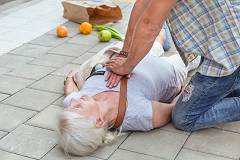 In a collapsed society, medical facilities may be scarce or overwhelmed, so basic medical skills will be crucial to keeping yourself and others healthy.
In a collapsed society, medical facilities may be scarce or overwhelmed, so basic medical skills will be crucial to keeping yourself and others healthy.
-
First Aid and Trauma Care: Knowing how to treat injuries, clean wounds, set bones, and manage infections is essential when professional medical help is unavailable. Having a solid grasp of first aid techniques, including CPR, is critical.
-
Herbal Medicine: In the absence of pharmaceuticals, understanding how to use herbs and plants for healing is a valuable skill. Many plants have medicinal properties that can treat common ailments such as colds, stomach issues, and minor injuries.
-
Basic Medical Procedures: Some medical procedures, such as suturing wounds, managing burns, or treating fractures, can be learned and practiced. Having someone in your community with these skills could make the difference between life and death.
5. Clothing and Textiles
 In a world where you can’t just buy new clothes, being able to repair or make your own clothing will be crucial for protection against the elements.
In a world where you can’t just buy new clothes, being able to repair or make your own clothing will be crucial for protection against the elements.
-
Sewing and Mending: Whether you need to patch up holes in your clothing or make entirely new garments, sewing is an important skill. You can also repurpose fabric from old clothes or household items.
-
Leatherworking: If you have access to animal hides, you can make your own shoes, belts, and other accessories. Leather is durable and versatile, making it a valuable material for clothing, tools, and storage.
-
Knitting and Weaving: Crafting your own textiles, such as blankets, sweaters, or scarves, can help keep you warm during colder months, especially if heating is limited.
- YouTube Playlist: Beginners Sewing Tutorials by Made to Sew • 11 videos
- YouTube Playlist: How to Sew Clothes for Beginners by TheCraftyGemini • 34 videos
- YouTube Playlist: Leatherworking Beginner Series by Rainier Leather Company • 8 videos
- YouTube Playlist: Learn how to knit - Essential knitting techniques for beginners by NimbleNeedles • 16 videos
6. Water Sourcing and Purification
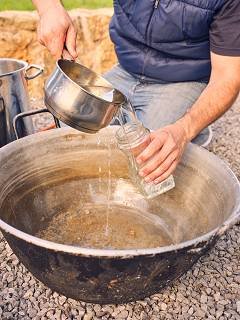 Without access to municipal water, finding and purifying water becomes a daily concern.
Without access to municipal water, finding and purifying water becomes a daily concern.
-
Water Collection and Storage: Simple systems like rainwater catchment, wells, or using natural springs can provide a consistent water supply. Learning how to collect and store water in a safe and hygienic manner will be a daily necessity.
-
Water Purification: Drinking untreated water can lead to serious illnesses. Understanding how to purify water through methods like boiling, filtration, or chemical treatments will ensure that you have a safe water supply.
- YouTube Playlist: water storage and collecting shower etc by Jim Lee • 62 videos
- YouTube Playlist: Off-Grid Rainwater Collection and Storage by UncleHank • 26 videos
- YouTube Playlist: Water Purification by ForMyJesus • 7 videos
7. Mechanical and Engineering Skills
 In a resource-scarce world, the ability to maintain and repair tools, vehicles, and other mechanical systems will provide a significant advantage.
In a resource-scarce world, the ability to maintain and repair tools, vehicles, and other mechanical systems will provide a significant advantage.
-
Vehicle Maintenance: Whether it’s a bicycle, car, or other transport, knowing how to perform basic repairs and maintenance will keep you mobile.
-
Engine and Generator Repair: If you rely on small-scale energy sources, such as solar panels or generators, understanding how to fix them when they break down will keep the lights on.
8. Bartering and Trade
 In a world without a functioning economy, bartering will likely become the primary method of exchange.
In a world without a functioning economy, bartering will likely become the primary method of exchange.
-
Negotiation Skills: Being able to trade goods and services is key to obtaining what you need from others. Knowing the value of your goods and what others need is crucial for fair trade.
-
Resource Management: Smartly stockpiling and managing your resources will help you survive when supplies run low. Understanding what items or skills will be in high demand will allow you to trade effectively.
9. Mental Resilience and Adaptability
Surviving a societal collapse isn’t just about practical skills; it’s also about mental resilience.
-
Mental Health Management: Being able to cope with stress, anxiety, and uncertainty will help you stay focused and make rational decisions. Meditation, self-reflection, and community support can help maintain mental well-being.
-
Adaptability: Flexibility and creativity in solving problems and making do with limited resources will make a significant difference in how well you can handle an unpredictable environment.
- Resource: Solymar Online Therapy offers affordable private counselling and therapy. By using video conferencing, you can be assured of privacy and security.
Conclusion
In a collapsed society, the ability to protect oneself with firearms is just a small part of the survival equation. Practical, self-reliance skills-such as growing food, preserving it, repairing shelters, and maintaining health-would become the bedrock of survival. Those who are versatile, adaptable, and community-minded will have the best chance of thriving in such a world.
